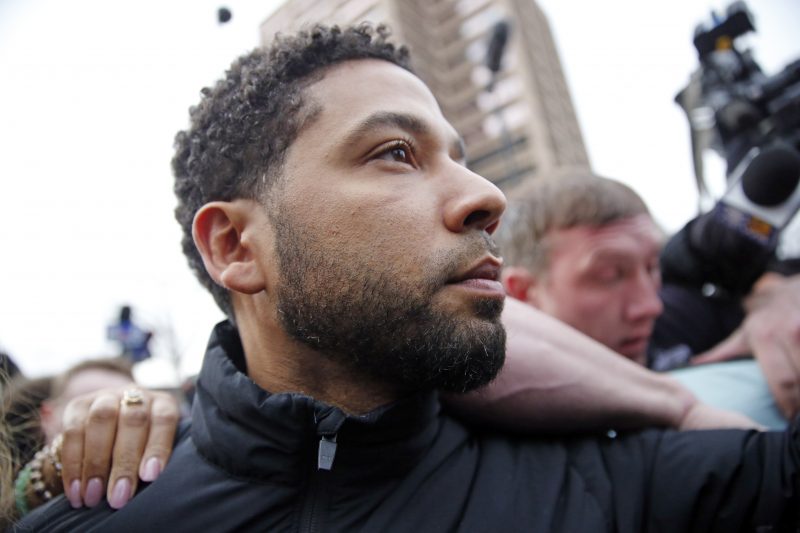The Smollett hate crime case — and why it won’t go to trial
The decision to drop all 16 felony charges against US actor Jussie Smollett, who was accused of staging a hoax hate crime attack against himself, has revived debate about prosecutorial discretion (NUCCIO DINUZZO)
Washington (AFP) – A television actor claims to be the victim of a racist, homophobic hate crime. Chicago police say he staged the whole thing. The chief prosecutor says she believes he is guilty.
So why isn’t the matter going to trial?
The curious case of Jussie Smollett, who stars on Fox music drama “Empire,” got even weirder when prosecutors in Illinois’ Cook County — who handle crimes in Chicago — dropped the charges Tuesday.
On Thursday, President Donald Trump said that the FBI and the Justice Department will review the case — calling it “outrageous” and an “embarrassment to our Nation!”
All of this has revived the long-simmering debate in America about how just the US justice system really is, whether the rich get off easy — and whether prosecutors should have so much discretion.
At both the federal and state level, prosecutors are widely free to pursue cases as they see fit. They supervise the initial investigations, take cases to trial or not, and recommend sentences.
“It’s a long-standing tradition, a cultural norm in the United States,” says Rory Little, a professor at the University of California, Hastings College of the Law in San Francisco.
“Prosecutors want to have flexibility,” Little told AFP.
For Carl Tobias, a professor at the University of Richmond’s TC Williams School of Law, “a big concern is overreach, that they go too far… prosecuting people who should not be prosecuted or by seeking penalties that are too large for the infraction.”
This can especially be a concern at the state level, where prosecutors are elected officials, and want to show constituents they are being tough on crime.
But in Smollett’s case, some say they did not go far enough.
– ‘Prosecutors caved’ –
Smollett, who is black and openly gay, said he was attacked on the streets of America’s third-largest city in late January by two masked men hurling abuse at him.
The 36-year-old claimed they tied a noose around his neck and doused him with a chemical substance.
But quickly, the story unraveled.
Police say Smollett hired a pair of brothers he knew from the “Empire” set to stage the attack — and paid them for it.
Nevertheless, the actor has maintained his innocence.
“I have been truthful and consistent on every single level since day one,” Smollett told reporters on Tuesday.
Prosecutors said Tuesday they made a deal with the actor under which he agreed to perform community service and forfeit a $10,000 bond payment in exchange for the 16 felony counts to be dismissed.
But his attorneys say no agreement was made.
And after Trump’s probe announcement, his attorney Tina Glandian told NBC News on Thursday: “Nothing improper was done.”
Some experts say the actor definitely got special treatment.
“I think prosecutors caved to the court of public opinion and gave the case away,” said Bob Bianchi, a former prosecutor in New Jersey, decrying a “sickening abuse of prosecutorial discretion.”
Tobias says prosecutors “are often overloaded — they have too many cases to give all of them the attention they need, so they need to have the flexibility to cut plea deals.”
Indeed, prosecutor Joseph Magats said Cook County’s limited resources were better used focusing on gun violence in the Windy City, and not on Smollett.
– ‘Whitewash’ –
The controversy over the case is far from over.
Chicago Mayor Rahm Emanuel has called the result a “whitewash of justice.”
“You cannot have, because of a person’s position, one set of rules apply to them and another set of rules apply to everybody else,” he said.
Under fire, Cook County State’s Attorney Kim Foxx said she believed Smollett was guilty and insisted he was treated the same way as many other low-level offenders.
“I cannot offer him the opportunity to forfeit his bond… if I didn’t believe he is guilty,” Foxx told Chicago television station WGN.
“I have an ethical obligation that, if I believe someone is not guilty, I have to drop the charges without condition,” she said.
“This wasn’t about the integrity of the case.”
But skeptics remain unconvinced, especially as details of the case were sealed.
“Isn’t it a hopeful sign for America that regardless of your race or sexual orientation, all rich famous people get off easily?” late-night comic Stephen Colbert quipped.
Disclaimer: This story is published from a syndicated feed. Siliconeer does not assume any liability for the above story. Validity of the above story is for 7 Days from original date of publishing. Content copyright AFP.


